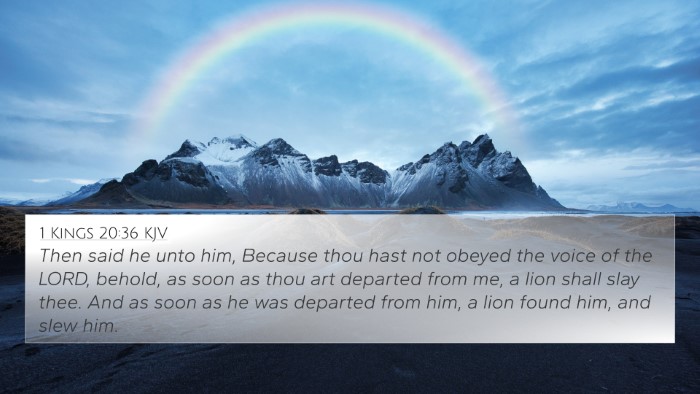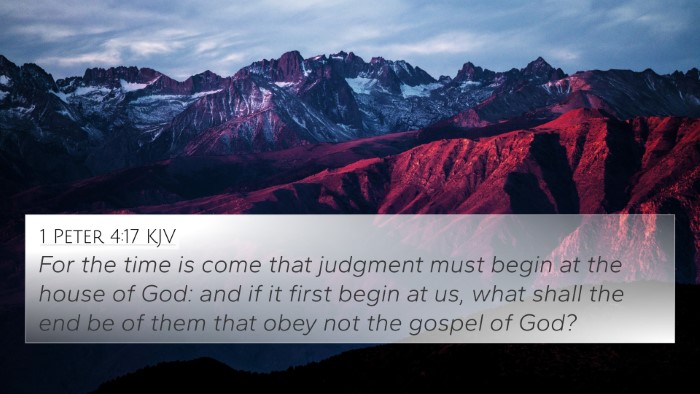Understanding 1 Kings 13:24
In 1 Kings 13:24, we read about a prophet who meets a tragic end after having initially obeyed the command of God.
This verse captures a pivotal moment that emphasizes the consequences of disobedience and the necessity of correctly following divine instructions.
Verse Text
1 Kings 13:24 (KJV): "And when he was gone, a lion met him by the way, and slew him: and his carcase was cast in the way, and the ass stood by it; the lion also stood by the carcase."
Summary of Meaning
-
Disobedience to God's Command:
This passage illustrates the severe consequences of disobeying God's direct command.
The prophet, after delivering God's message, was instructed not to eat or drink in the land, yet he ultimately succumbed to temptation, leading to his demise.
-
The Symbolism of the Lion:
The lion represents divine judgment and the seriousness of disregarding God's directives.
It serves as a potent example of the danger that follows when one diverts from the path prescribed by the Lord.
-
Isolation of Judgment:
The way the body is left — the carcass on the road with the lion and donkey standing beside it — conveys a message that even nature itself adheres to divine justice and truth.
-
God's Sovereignty:
This incident underscores God's sovereignty, illustrating His ability to utilize creation (the lion) to enact His will and uphold His commandments.
Verse Cross-References
Below are significant cross-references that help to deepen the understanding of 1 Kings 13:24.
These verses showcase connecting themes such as obedience, divine judgment, and the consequences of straying from God’s command.
-
2 Kings 23:17-18:
This passage reflects the fulfillment of prophecy through judgment, much like the consequences faced by the prophet in this verse.
-
1 Samuel 15:23:
Here, Saul's disobedience results in God rejecting him, paralleling the consequences faced by the unnamed prophet.
-
Jeremiah 44:4-5:
Jeremiah warns people against following false gods, resonating with the idea of adhering to God's commands strictly.
-
Romans 1:18:
The concept of divine wrath against disobedience is further emphasized, showing continuity in God’s treatment of sin across different covenants.
-
Hebrews 10:31:
The verse warns of the fearful consequences of falling into the hands of the living God, akin to the fate of the prophet.
-
Proverbs 14:12:
It warns about the way that seems right, but leads to death, echoing the theme of misjudgment in this narrative.
-
Matthew 7:13-14:
This passage discusses the narrow gate that leads to life and the broad path to destruction, reflecting the choices and consequences of the prophet's actions.
-
Luke 9:62:
Jesus speaks about the necessity of commitment to the path of discipleship, connecting themes of loyalty to divine commands.
-
James 1:22:
This verse emphasizes the importance of being doers of the word and not hearers only, reflecting the disobedience of the prophet.
Implications for Today
The narrative of 1 Kings 13:24 serves as a powerful reminder for believers today.
It warns of the dangers of disobedience to God’s word, highlighting the necessity for vigilance in adhering to His teachings.
As we analyze this scripture in its broader context, we recognize the importance of following God’s directions faithfully.
The consequences of ignoring such guidance can be profound, urging us to seek continual alignment with divine will.
Conclusion
In conclusion, 1 Kings 13:24 illustrates crucial themes of obedience, judgment, and divine sovereignty.
The prophet's story is a cautionary tale, urging believers to resist temptations and adhere steadfastly to God's commands.
Through the cross-referenced verses, we can see a cohesive narrative that connects various biblical teachings, reinforcing the notion that faithfulness to God's word is paramount.
Further Study
To further explore the themes of 1 Kings 13:24, consider utilizing tools for Bible cross-referencing.
These tools can help in:
- Identifying connections between Old and New Testament teachings.
- Conducting comparative studies of related verses.
- Enhancing sermon preparation through careful verse analysis.
- Developing a deeper understanding of Biblical themes through inter-Biblical dialogue.









